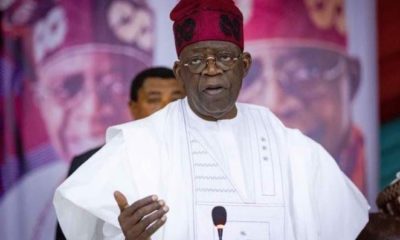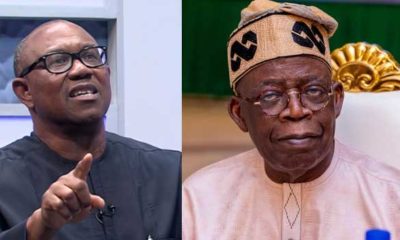Politics
Countdown To A New Era: Nigerians Await Tinubu’s Presidency For Positive Change

With less than a month left until the inauguration of Bola Ahmed Tinubu as the next President of Nigeria, the excitement and anticipation among his supporters and political observers is palpable.
The end of President Muhammadu Buhari’s administration is in sight, and Nigerians are hopeful for better leadership and positive transformation across all sectors of the country.
Tinubu’s leadership has been a topic of discussion among Nigerians since his emergence as the All Progressives Congress presidential candidate.
While some criticized and made mockery of him due to his old age and the gaffes he made during his campaign speech, others sees him as the rightful candidate for the position.
According to his supporters, his track record as a former governor of Lagos State and his leadership experience make him a capable and qualified leader to tackle challenges and bring about the much-needed transformation in the country.
Bola Ahmed Tinubu served as the governor of Lagos State from May 1999 to May 2007, during which he implemented numerous policies and initiatives that transformed the state into a vibrant and dynamic hub of economic and social development.
Under Tinubu’s leadership, Lagos State experienced a surge in economic growth and development. The state was allegedly generating about 600 million monthly a very meagre fee for over 10 million people but when he left office Lagos was allegedly generating about 15billion monthly an increase of over 1000%.
As the countdown to his inauguration continues, the hope and optimism among Nigerians remain high, and the expectation is that his administration will bring about the change that the country needs.
During his campaign, Tinubu made several promises to the Nigerian people, outlining his vision and plans for the country.
The All Progressives Congress (APC) presidential candidate, Tinubu, released an 80-page policy document detailing his eight-point agenda in october 2022.
National security, economy, agriculture, power, oil and gas, transportation, and education were listed as the areas of focus.
The objective of the manifesto, according to Tinubu, is to establish a new society founded on shared prosperity, compassion, tolerance, and equal respect for every citizen. The document includes ten promises that Tinubu intends to fulfill if elected.
The first promise is to create a Nigeria that provides decent jobs and wages to the youth, enabling them to live a better life.
Secondly, he plans to transform Nigeria into a nation of creators, where goods and services are manufactured and invented, rather than just consumed.
He also intends to increase exports and reduce imports to strengthen the naira and enhance Nigeria’s way of life.
The manifesto also prioritizes enlightened agricultural policy to support farmers, modernizing public infrastructure to promote economic growth, and harnessing emerging sectors to empower young people and women.
The goal is to create a Nigeria where no parent has to worry about sending their children to bed hungry, by training and offering economic opportunities to the poorest and most vulnerable.
Additionally, Tinubu pledges to generate, transmit, and distribute sufficient and affordable electricity, provide basic healthcare, education, and housing for all, and establish a strong national security architecture to eradicate terrorism, kidnapping, banditry, and violent extremism in Nigeria.
On January 8th, 2023, Tinubu addressed an endorsement rally organized by the area community in Lagos at the Mobolaji Johnson Stadium, Onikan. During his speech, he assured Nigerians of his commitment to fulfilling his campaign promises if elected as the next president.
He also assured that his government would be for all Nigerians, regardless of their tribes and faith.
“My respect for this country will continue to increase, and I will honour all my pledges that we all will live in harmony. We belong in each other’s hearts,” Tinubu said.
“From the moment I enlisted in politics, I have always been nationalistic and detribalised in my approach. I do not operate based on ethnicity, region or religion. I have friends and associates in all corners of this country.
“As governor of Lagos State, I constituted a cabinet, comprising competent people from all parts of Nigeria. We had the Yoruba, as we had the Igbo and Arewa. What was important to me was not your ethnicity or creed, it was your competence and the value you would bring to governance and people. To replicate this feat for the country is why I have offered myself for the presidency,” he said.
During his presidential campaign rally, Bola Ahmed Tinubu made several promises to the states, and he is expected to deliver on those promises.
On 11th February 2023, at a rally in Abuja, Tinubu reiterated his commitment to addressing the underdevelopment of the country, with a particular focus on the youth. He pledged to build a Nigeria that all citizens would be proud of, in all its ramifications.
He said “And I say the fact that what we are doing is about our youth, about our children, about our today, tomorrow and day after. Be proud of our Nigeria. We will make you productive citizens of this country. We will make you great educator, great inventors and great developers.”
In February, during his campaign in Gombe state, he promised to bring prosperity to the people of the state making it one of the richest in the country if elected.
He said “my own is to seek the blessing and cooperation of the people. Prosperity is here now, development is here now. For several years we prayed to find oil, now kolmani has given you the resources to commence training and development of the petroleum located in kolmani and other places.”
Also during his presidential rally in Ekiti state he said in Yoruba “be rest assured this election is your own, is that not so? It is an election that will guarantee your freedom. Unemployed youth are many and they graduated from school so they deserve jobs.”
As Bola Ahmed Tinubu prepares to take the oath of office as Nigeria’s next President, the nation eagerly awaits the changes and progress he has promised.
With his track record of economic growth, infrastructure development, education, and public safety during his tenure as governor of Lagos State, many Nigerians are optimistic that his leadership will bring about positive transformation across the country.
Politics
JUST IN: Reps Committee Finally Meets Rivers Sole Administrator After Delays
After a series of delays, the House of Representatives ad hoc committee on Rivers State has finally held its much-anticipated meeting with the Sole Administrator of the state, Retired Vice Admiral Ibok Ete Ibas.
The meeting, which took place in Abuja, comes as the House exercises its constitutional powers to assume the functions of the Rivers State House of Assembly, following the ongoing political crisis in the state.
In his opening remarks, Vice Admiral Ibas apologised for his inability to attend earlier scheduled meetings, citing the need for more time to settle into his new role.
READ ALSO: Ibas Makes First Appearance At NEC Meeting As Rivers Sole Administrator
He told the committee that he is still acclimatising to the demands of his position and appealed for the lawmakers’ understanding as he prepares to provide a detailed briefing.
Shortly after his plea, the session went into a closed-door meeting, with journalists and observers asked to leave.
More to follow………….
Politics
Obi, Kwankwaso Helped Tinubu In 2023, Will Do The Same In 2027, Says Nigerian Activist
Deji Adeyanju, a Nigerian activist and lawyer, has made explosive claims regarding the 2023 presidential election, suggesting that former Labour Party (LP) candidate Peter Obi and New Nigeria Peoples Party (NNPP) leader Rabiu Kwankwaso secretly supported President Bola Tinubu’s campaign.
In a post shared on his 𝕏 page Thursday, Adeyanju contended that Obi, who ran against Tinubu, would likely continue to support the president in future political endeavors.
He expressed certainty that Obi would decline any efforts to form a coalition aimed at challenging Tinubu in the next election.
READ ALSO: Lad Who Stood In Front Of Obi’s Convoy Apprehended For Street Fighting – Police
“I’m 100% convinced that Obi worked for Tinubu in 2023 and will do so again. I might be wrong, but I’m convinced in my mind about this,” Adeyanju wrote.
“Once a businessman, always a businessman. Those still in doubt will see the clear handwriting before 2027. He will refuse to join the coalition,” he continued.
Additionally, Adeyanju accused Kwankwaso of working in favor of Tinubu during the previous election.
He emphasized that for any opposition coalition to succeed in the 2027 race, figures like Obi and former Vice President Atiku Abubakar—another presidential hopeful—must step aside.
“For the coalition to succeed, all the self-centered politicians like Atiku & Obi should promise not to run and allow neutral folks to run against Tinubu,” Adeyanju proposed. “This is how to put the interest of the nation above personal interest,” he added.
The activist went on to criticize the culture surrounding Nigerian politics, describing it as an industry driven by opportunism.
He lamented the presence of “merchants” surrounding top politicians, accusing them of putting personal gain ahead of the country’s well-being. “The biggest industry in Africa is politics,” Adeyanju said.
“And those around popular politicians are all merchants. Once politics is around the corner, they are in business. Con men and women who just want to cash out.”
Politics
Ibas Makes First Appearance At NEC Meeting As Rivers Sole Administrator
Retired Vice Admiral Ibok-Ete Ibas, the Sole Administrator of Rivers State, attended his first National Economic Council (NEC) meeting today at the Presidential Villa in Abuja.
Ibas was appointed to the position by President Bola Tinubu following the suspension of Governor Siminalayi Fubara in March 2025.
READ MORE: Tinubu Swears In Ibas As Rivers Sole Administrator
The NEC meeting, which is being presided over by Vice President Kashim Shettima, gathered a number of state governors and deputy governors from across the 36 states of Nigeria to discuss important national economic issues.
Among the notable figures in attendance was Governor Sheriff Oborevwori of Delta State, who recently defected to the All Progressives Congress.
Governor Oborevwori led the opening prayers at the meeting on the instruction of Vice President Shettima.
Other state governors present included Rev. Fr. Hycinth Alia of Benue State, Abdulrahman Abdulrazak of Kwara, Monday Okpebholo of Edo, and Bassey Otu of Cross River, along with several deputy governors.



















